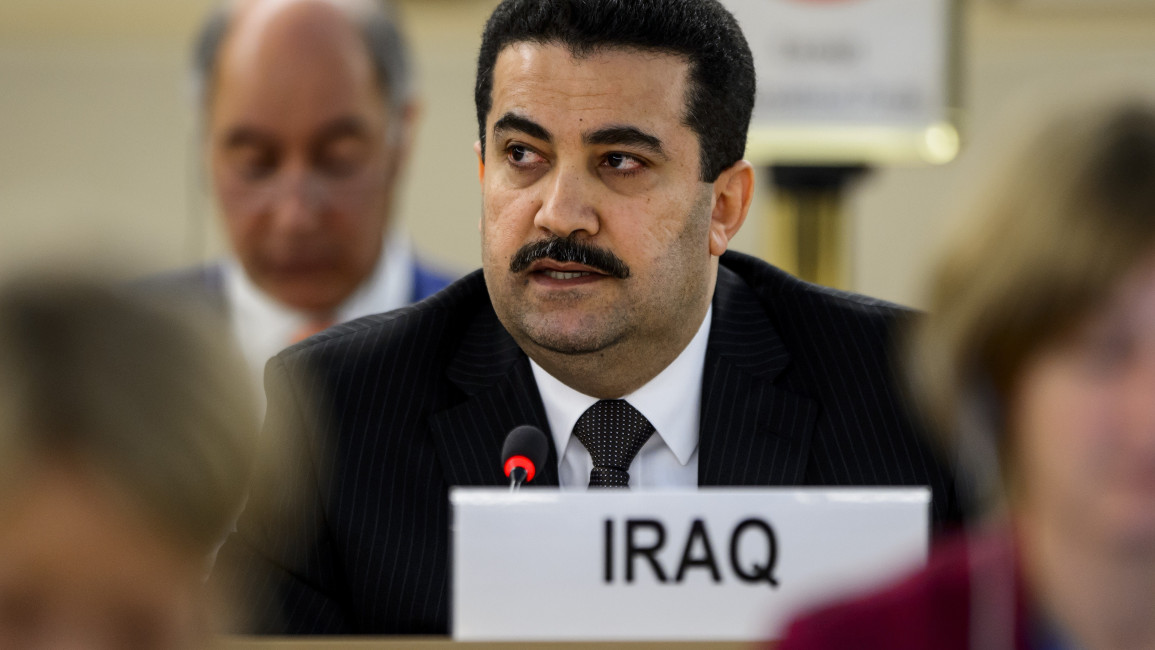After months of political stalemate, pro-Iran Shia groups nominate Mohammed Shia’ al-Sudani to be the new Iraqi prime minister. [Getty]
The Coordination Framework, an umbrella parliamentary bloc including all Iran-backed Shia factions, formally nominated Mohammed Shia’ al-Sudani to be the new Iraqi prime minister, Iraqi state media reported Monday.
“Today, the leaders of the Shia framework met in positive conditions and they unanimously agreed to nominate Mr Mohammed Shia’ al-Sudani for the [Iraqi] premiership,” read a statement released by the Coordination Framework.
Al-Sudani, 52, is a Shia Iraqi lawmaker from the south-eastern Maysan Governorate. He has a Bachelor’s degree in agricultural sciences. He has held several posts and ministerial portfolios in the Iraqi government, including the governor of Maysan, the minister of human rights in 2010, and the minister of labour and social affairs in 2014.
Today’s announcement came after Iraq’s National Security Advisor Qasim al-Araji apologised on Sunday for running for the Iraqi PM post.
The nomination will accelerate the efforts in electing a president and forming a new cabinet following more than nine months of political stalemate after the country held an early election on 10 October 2021.
The powerful Shia cleric Muqtada Al-Sadr won a majority with 73 seats in the election and vowed to form a “national majority” government with several Sunni and Kurdish blocs, signalling against pro-Iran Shia blocs. Frustrated in his efforts to fulfil his promise to his supporters, however, Sadr ordered lawmakers from his bloc to resign, which all his MPs did on 12 June.
The Coordination Framework replaced Sadr’s MPs with their own, becoming the biggest bloc in the Iraqi parliament. They vowed to form a consensus government that would include all the Sunni and Kurdish blocs.
The Iraqi parliament is expected to hold a session this week to elect a president for the country. According to the Iraqi constitution, the elected president would then assign al-Sudani to form a cabinet within one month.
Since 2003, when the US-led invasion toppled the former regime of Saddam Hussein, Iraq has been run through a proportional sectarian system. Accordingly, the prime minister position is allocated for the Shias, the presidency for the Kurds and the speaker of the parliament for the Sunnis.
The two main Kurdish parties, the Patriotic Union of Kurdistan (PUK) and the Kurdistan Democratic Party (KDP) have two separate candidates for Iraq’s presidency. Rebar Ahmed, the interior minister in the Kurdistan Regional Government (KRG) is KDP’s candidate while the incumbent president of Iraq, Barham Salih, is the PUK’s candidate, running for a second term.
The Coordination Framework asked the two Kurdish parties to agree on a unified candidate for the Iraqi presidency, but the two parties have failed to agree on that so far.
The Coordination Framework previously has said they would vote for Salih in case the KDP did not withdraw its candidate, since the PUK has good relations with Iran and it is an ally to the pro-Iran Shia groups.
